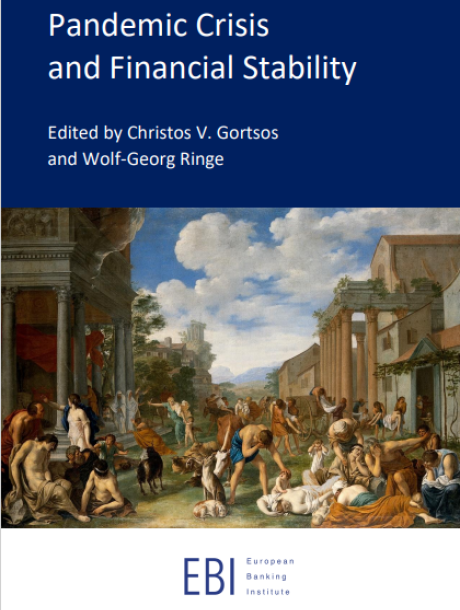
Pandemic Crisis and Financial Stability
The pandemic crisis, which broke out in early 2020, is still affecting human lives and economic activity around the globe, causing unprecedented transformations which were not foreseen just before its onset. The European Union, its citizens and the financial and non-financial firms active therein have also been negatively affected (albeit to a varying degree).
Nevertheless, unlike in the two previous, most recent economic crises, namely the 2007-2009 Global Financial Crisis (GFC) and the 2010-2018 sovereign debt crisis in the Eurozone, the impact on the stability of the EU financial system has been comparatively mild so far. This is due to several reasons: most importantly, the root-cause of the pandemic was not attributed to any sector of the financial system but originated in the real economy. Further, the financial regulatory framework had become much more robust in the meantime (albeit also much more complicated to comply with), credit institutions in particular are better capitalised now than in 2008, with (almost across the board) lower ratios of non-performing loans (NPLs) and significantly stronger liquidity, while financial supervision has also been enhanced and the macro-prudential financial framework adopted in the wake of the GFC was fully activated. Finally, many EU Member States and the EU itself acted decisively, and proactively pumped billions of Euros of support programmes into the real economy to prevent an economic meltdown.
During the last 15 months, national and EU institutions and agencies have orchestrated their efforts towards establishing an appropriate framework in order to primarily support those parts of the population and of the businesses most severely affected by the pandemic and to contain its negative effects. This included a combination of fiscal policy, monetary policy and financial policy measures; new instruments and rescue funds were introduced, flexibility in the application of several existing rules has been applied to the extent necessary and feasible, and some ‘quick-fix’ legislative actions supplemented the pandemic crisis management toolbox.
When we published the first edition of this EBI e-book in May 2020 (‘Pandemic Crisis and Financial Stability’, https://ssrn.com/abstract=3607930), the world seemed to be on the brink of collapse. Reflecting the positive developments over the past year, this second edition supports a more optimistic approach on the further evolution of the pandemic. Entitled ‘Financial stability amidst the pandemic crisis: On top of the wave’, the key assumption is that the various infection waves of the crisis will not be followed by another severe one, as are we gradually reaching a much-desired point of ‘new normality’. And yet, we are ‘on top of the wave’ of the crisis as a whole, as our book title suggests. Therefore, challenges in relation to financial stability should not be underestimated, especially in (but not limited to) the field of NPLs, a new wave of which is emerging due to the impact of the pandemic on the businesses and households mostly affected. Furthermore, accommodating monetary policy measures, conventional and unconventional, fiscal stimuli and temporary financial measures will be lifted as well, meaning that several safety-net components embedded during the pandemic in the institutional and regulatory framework will cease to support economic (including financial) activity in the steady state. In addition, the discussion on the challenges linked inter alia to climate change is in the current constellation more focused than ever before and the adoption of measures to mitigate the related risks is high on policymakers’ and financial supervisors’ agendas. We sincerely hope that this volume will contribute to this debate and may serve as a platform for dialogue to reflect on the right way forward.
This publication contains 17 articles, structured in 5 sections, and discussing all of the above considerations. We are grateful to all authors, most of them members of the Academic Board of the European Banking Institute, who participated in this academic work with their valuable contributions. They develop on various regulatory aspects arising from the prolonged pandemic and related to various aspects of financial stability, at a moment when the (potentially treacherous) perception is that we are close to returning to a new normal. The contributors also discuss the long-term implications for banking and financial markets, and/or arrangements for transitioning back to post-pandemic times.
Contributors
Bocconi University - Department of Law; European Banking Institute; Ca Foscari University of Venice; Bocconi University - Baffi Carefin Centre; Frankfurt School of Finance & Management; EUSFIL Jean Monnet Centre of Excellence
University of Edinburgh - School of Law
HEC Montreal ; HEC Montreal
University of Luxembourg
Universidad Carlos III de Madrid
University Rome III, Department of Law
Radboud University Nijmegen - Institute for Financial Law (IFR)
City University London - The Business School
Trinity College Dublin - School of Law
Bocconi University - Bocconi Law Department; University of Oxford - Faculty of Law; European Corporate Governance Institute (ECGI); European Banking Institute
LUMSA University
Università Cattolica del Sacro Cuore
Centre for European Policy Studies (CEPS)
University of St. Gallen (HSG); Radboud University Nijmegen; EUSFIL Jean Monnet Centre of Excellence
Goethe University Frankfurt - Faculty of Economics and Business Administration; Leibniz Institute for Financial Research SAFE
Leiden University; European Banking Institute
University of Bologna - Department of Business Law
University of Vienna
University of Lisbon - School of Law. Jean Monnet Chair – Economic Regulation in the EU
Universidad Carlos III de Madrid; EUSFIL Jean Monnet Centre of Excellence
CSEF - University of Naples Federico II - Centre for Studies in Economics and Finance (CSEF); Einaudi Institute for Economics and Finance (EIEF); Research Institute of Industrial Economics (IFN); Centre for Economic Policy Research (CEPR); European Corporate Governance Institute (ECGI)
Universidad Complutense de Madrid (UCM)
Università Cattolica ; EUSFIL Jean Monnet Centre of Excellence
Court of Justice of the European Union
University of Genoa - Law Department; European Banking Institute; EUSFIL Jean Monnet Center of Excellence on Sustainable Finance and Law; Frankfurt School of Finance & Management; Bocconi University - Bocconi Law Department
Leibniz Institute for Financial Research SAFE; Goethe University Frankfurt - Faculty of Law; European Corporate Governance Institute (ECGI)
University of Geneva - Graduate Institute of International Studies (HEI); Centre for Economic Policy Research (CEPR)






